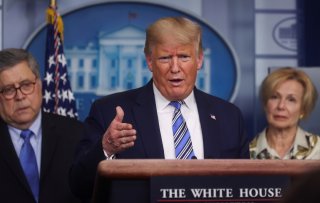Donald Trump's Coronavirus Economic Cure: Something Close to State Control?
While the election of Donald Trump, and the Republican Party’s subsequent handling of the coronavirus pandemic, might be a realignment of rhetoric, it is the same drastic economic intervention displayed by the right for years.
Crises are a time of rapid change. Uncertainty about the future, combined with pressure to act, and fear over alternatives leads to a quickening of political shifts. What might have taken years now occurs in a matter of weeks. Political scientists believed that the election of Donald Trump in 2016 might have been a realigning election. Four years later, the government’s response to the coronavirus pandemic appears almost as a fait accompli.
Donald Trump won the Republican presidential nomination against sixteen competitors in part because of his divergence on economic issues. As a candidate, Trump promised not to attempt reforms on entitlements programs like Medicare or Social Security. Reforming entitlements to prevent their eventual insolvency had been a goal of congressional Republicans for years. Trump also promised the imposition of trade tariffs and expounded an old-style theory of protectionism, an idea contrary to the Republican platform of managed, internationally negotiated trade deals.
While economic nationalists felt empowered by Trump’s election, in several ways the former real estate developer governed as a stand-in Republican. Tariffs were raised on China, with threats to impose them on Mexico and Europe as well. But his first year in office focused on the traditional conservative issues of cutting taxes and attempting to repeal the Affordable Care Act. There was no grand imposition of state leadership in the economy, nor central planning through a new industrial policy.
Now, however, as the economy tips over the cliff into a depression, Donald Trump is leading the Republican Party into what could be a new era of state control of the economy. The president has invoked his power under the Defense Production Act of 1950 to direct companies to produce more medical equipment, while congressional Republicans negotiate a bill to bail out major industries and shepherd them under state provisos. After lagging behind on “economic nationalism,” the GOP is jumping headfirst.
The change, however, might not be as sudden as many commentators think, nor go beyond a cursory level. The language of George W. Bush was very different than that of Trump’s; Bush praised market functions, a minimal regulatory hand, and the concept of a “limited government.” When the 2007-08 economic crash occurred, however, Bush was downright Trumpian.
“I’ve abandoned free-market principles to save the free-market system,” George W. Bush explained at the time. “I think when people review what’s taken place in the last six months, and put it all in one package, they’ll realize how significantly we have moved.”
Neither did it take a crisis for the Republican Party to abandon its platform commitments. In 2003 Bush passed Medicare Part D, which at the time was the largest addition to the welfare state since Lyndon Johnson’s Great Society.
While the election of Donald Trump, and the Republican Party’s subsequent handling of the coronavirus pandemic, might be a realignment of rhetoric, it is the same drastic economic intervention displayed by the right for years.
Hunter DeRensis is the senior reporter for the National Interest. Follow him on Twitter @HunterDeRensis.
Image: U.S. President Donald Trump addresses the coronavirus response daily briefing as Attorney General William Barr and Ambassador Debbie Birx, the White House coronavirus response coordinator, look on at the White House in Washington, U.S., March 23, 2020. REUTERS/Jonathan Ernst.

